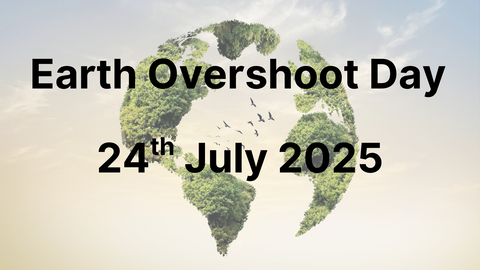Earth Overshoot Day marks the point in the year when humanity has used up all the natural resources the planet can renew within the same year

Today, 24th July, is Earth Overshoot Day This marks the point in the year when humanity has used up all the natural resources the planet can renew within the same year. For the rest of 2025 we are in ecological debt, using more than Earth can regenerate.
According to the Global Footprint Network, we are using resources 80% faster than ecosystem can replenish – essentially, living as if we had 1.8 Earths.
For the UK, Earth Overshoot Day fell on 20th May – over two months ago, reflecting the country’s disproportionately high ecological footprint. Last year, globally, it fell on 25th July 2024 – a day later, meaning that globally we’re trending in the wrong direction.
For the electrical industry, this moment is both a warning and an opportunity. With its central role in powering homes, cities and infrastructure, the industry is in a strong position to lead meaningful change.
Positive Change Is Already Underway
Across the sector, companies and professionals are taking steps to reduce their environmental impact. Examples include:
Energy efficiency through smart lighting, LED upgrades, and low-loss transformers
Smarter buildings using automation and real-time controls
Circular product design that supports repair, recycling, and reuse
EV infrastructure supporting the shift to clean transport
Upskilling of electricians and engineers to install and maintain new technologies
We’re seeing a rapid transition to cleaner, smarter grids, storage systems, and renewables. As sustainability becomes a business priority, the opportunity for impact is growing and offers a clear path to delay further Overshoot days.
In the UK, grid operators are already piloting transactive energy models and smart grids that balance local supply & demand in real time. Research indicates that integrating flexible distributed energy resources like residential batteries, EVs, and responsive appliances can significantly reduce waste, stress on generation assets, and grid-related emissions. Additionally, the UK’s commitment to grid digitalisation is boosting efficiency, supporting renewable integration, and increasing consumer control; all levers to delay ecological overshoot.
Plus, the UK’s clean energy trajectory is gaining momentum across multiple fronts:
Wind power: Both onshore and offshore installations continue to expand. Floating offshore platforms off Scotland are delivering multi‑gigawatt clean capacity
Solar PV: Though solar’s share in the UK remains modest, falling panel costs and recycling guidelines (supported by advancements in panel‑design stewardship) strengthen the case for solar expansion and waste reduction
Marine and tidal energy: The UK leads in wave and tidal R&D. Studies in Orkney suggest tidal streams could meet up to 11 % of UK power demand. Coupled with innovations in wave converters, these technologies form the bedrock of a diversified, resilient energy supply.
Looking Ahead
Overshoot Day arrives earlier and earlier each year. This is partly due to updated data and a reduction in Earth’s biocapacity but it also reflects ongoing pressure on the planet’s systems.
The electrical industry is at the heart of the sustainability conversation. But alongside the challenges posed by overconsumption of natural resources come a range of reasons for optimism.
Customers are asking for solutions that last. Regulations are evolving. The demand for clean energy and responsible systems is growing.
Yes, Earth Overshoot Day warns us we’re consuming more than the planet can regenerate. But the UK’s electrical industry is at the heart of a systemic shift, embracing clean power, smarter grids, and circular strategies that unite innovation and sustainability. These efforts redefine growth, showing future prosperity can be resource-light, technology-rich, and purpose-driven.